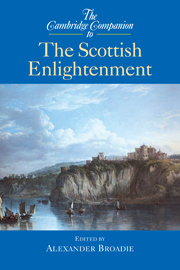Book contents
- Frontmatter
- Introduction
- 1 The contexts of the Scottish Enlightenment
- 2 Religion and rational theology
- 3 The human mind and its powers
- 4 Anthropology: the ‘original’ of human nature
- 5 Science in the Scottish Enlightenment
- 6 Scepticism and common sense
- 7 Moral sense and the foundations of morals
- 8 The political theory of the Scottish Enlightenment
- 9 Economic theory
- 10 Natural jurisprudence and the theory of justice
- 11 Legal theory
- 12 Sociality and socialisation
- 13 Historiography
- 14 Art and aesthetic theory
- 15 The impact on Europe
- 16 The impact on America: Scottish philosophy and the American founding
- 17 The nineteenth-century aftermath
- Select bibliography
- Index
10 - Natural jurisprudence and the theory of justice
Published online by Cambridge University Press: 28 May 2006
- Frontmatter
- Introduction
- 1 The contexts of the Scottish Enlightenment
- 2 Religion and rational theology
- 3 The human mind and its powers
- 4 Anthropology: the ‘original’ of human nature
- 5 Science in the Scottish Enlightenment
- 6 Scepticism and common sense
- 7 Moral sense and the foundations of morals
- 8 The political theory of the Scottish Enlightenment
- 9 Economic theory
- 10 Natural jurisprudence and the theory of justice
- 11 Legal theory
- 12 Sociality and socialisation
- 13 Historiography
- 14 Art and aesthetic theory
- 15 The impact on Europe
- 16 The impact on America: Scottish philosophy and the American founding
- 17 The nineteenth-century aftermath
- Select bibliography
- Index
Summary
COMMON FEATURES
Natural jurisprudence in the Scottish Enlightenment was first of all a theory of justice. Understood in this way, there are at least a couple of characteristics which give Scottish natural jurisprudence a specific difference from other major schools of thought and lend it a certain coherence for a century or more. One of them is that justice was not seen as a particular state of affairs or condition of the world in general. Scottish justice is not directly a matter of the distribution of goods or relations between classes of people. Nor is justice a formal quality of law in the abstract, a criterion for whether a rule in some sense really is 'valid law'. To put it more directly, eighteenth-century Scottish natural jurisprudence is neither Platonic, Aristotelian, Thomistic, Kantian nor utilitarian. In several of its expressions, it does have features in common with the empirical and naturalistic sides of Aristotelianism and utilitarianism, but neither suffices to characterise it. The common feature of the various Scottish theories of natural jurisprudence is that justice is to be treated as a characteristic of the individual person. Of course, a society – or a world – consisting of people with this feature is just, but that quality derives from the individuals making up the collective, and in the same way the justice of just law is a matter of the character of the individuals who adhere to such law.
In other words, for the Scottish theorists, justice was primarily a personal virtue. By virtue they meant two things, the propensity to a certain type of behaviour, and the ability to appreciate the moral worth of such behaviour both in oneself and in others.
- Type
- Chapter
- Information
- The Cambridge Companion to the Scottish Enlightenment , pp. 205 - 221Publisher: Cambridge University PressPrint publication year: 2003
- 6
- Cited by



